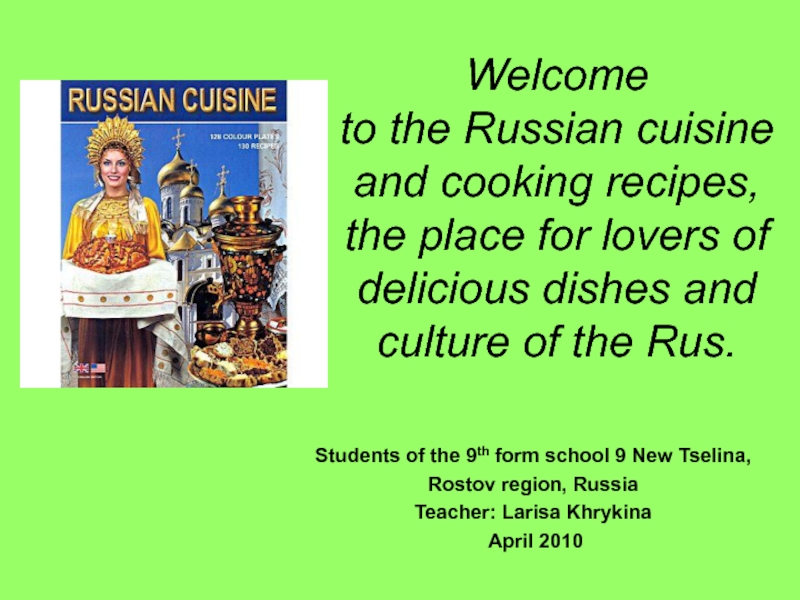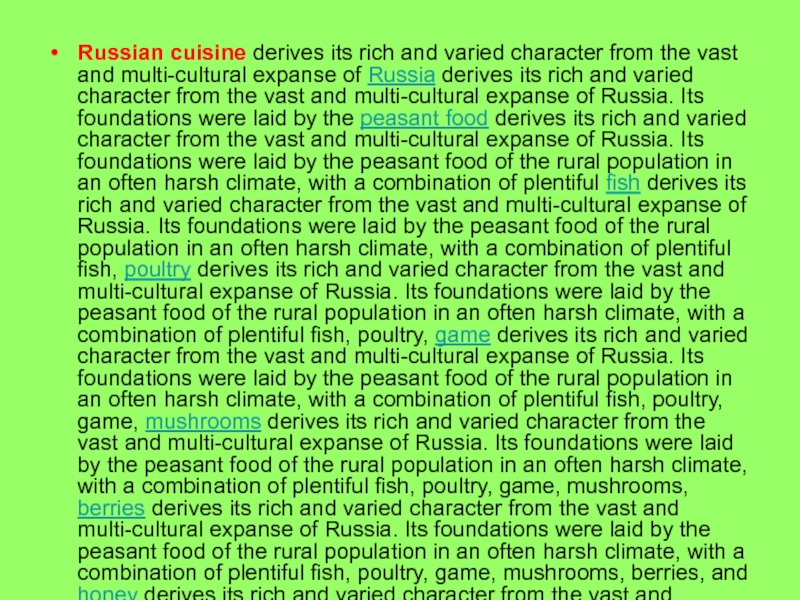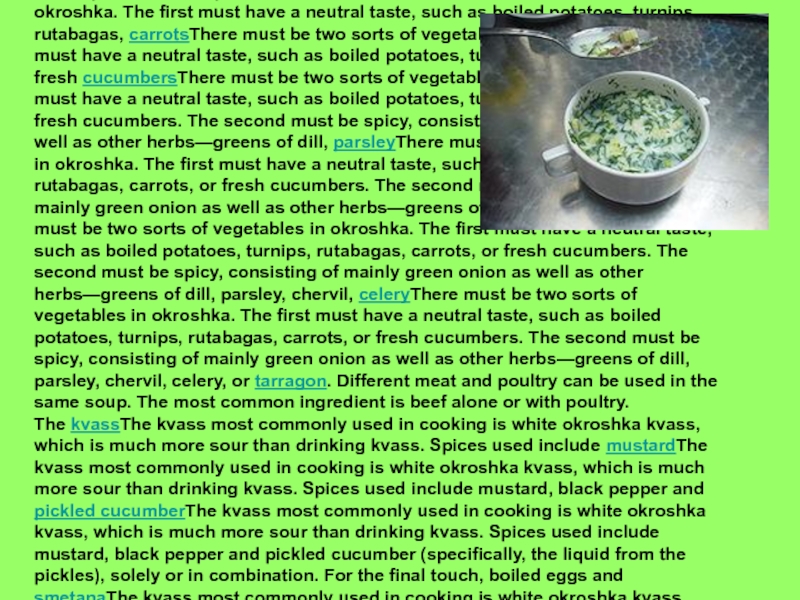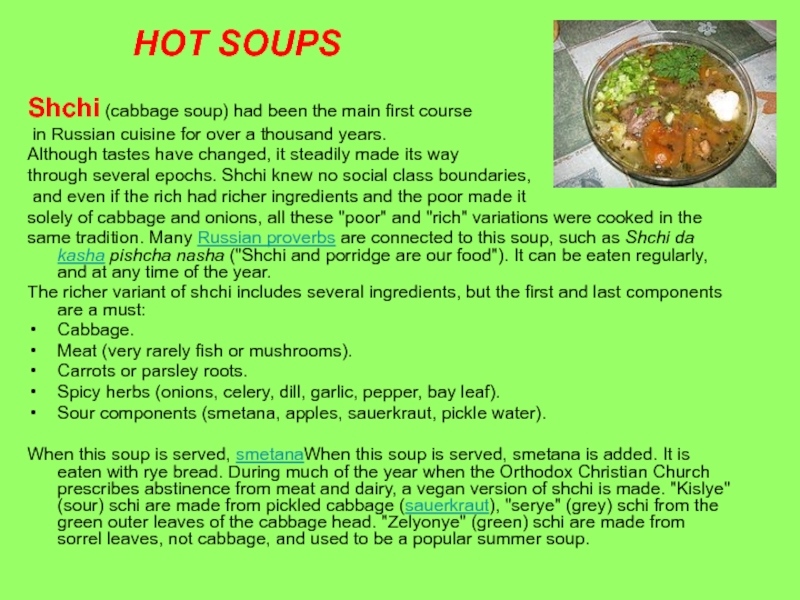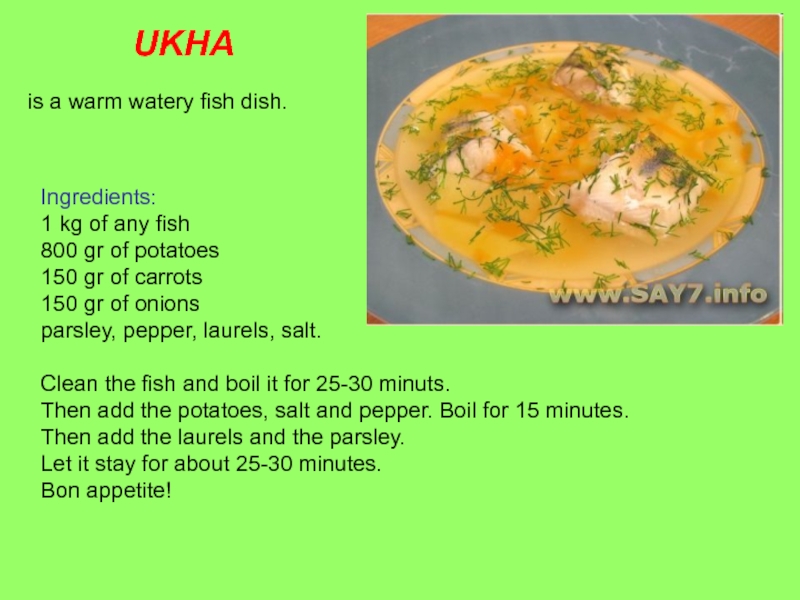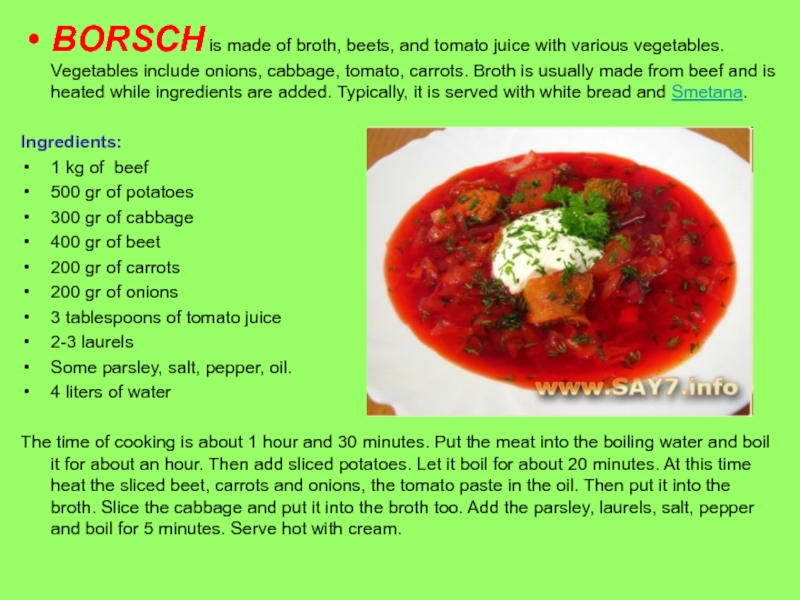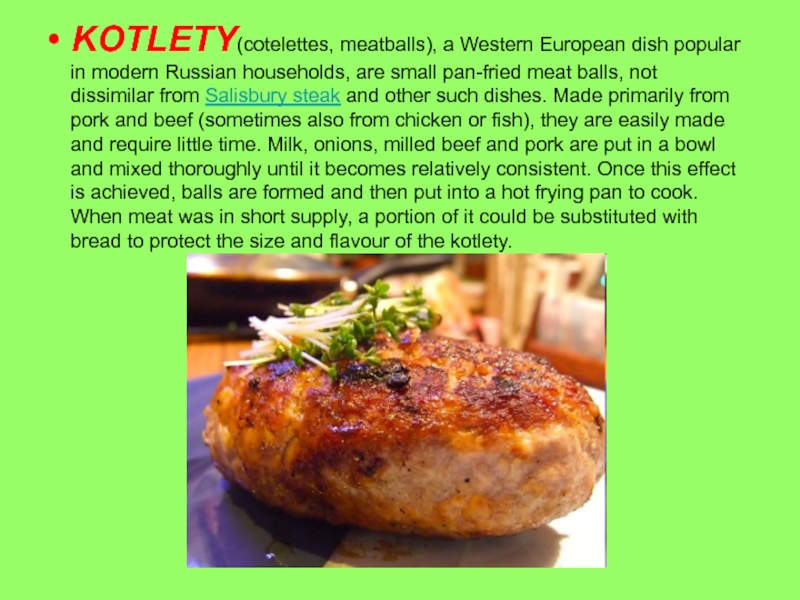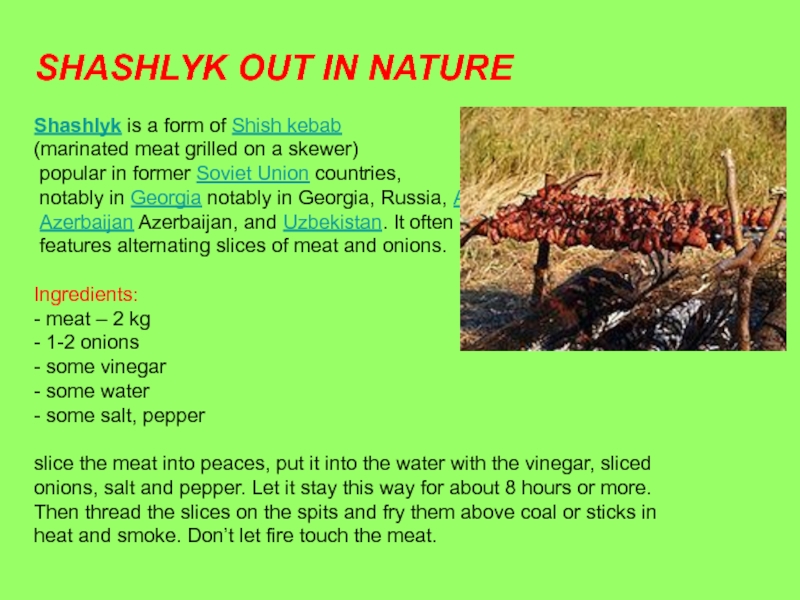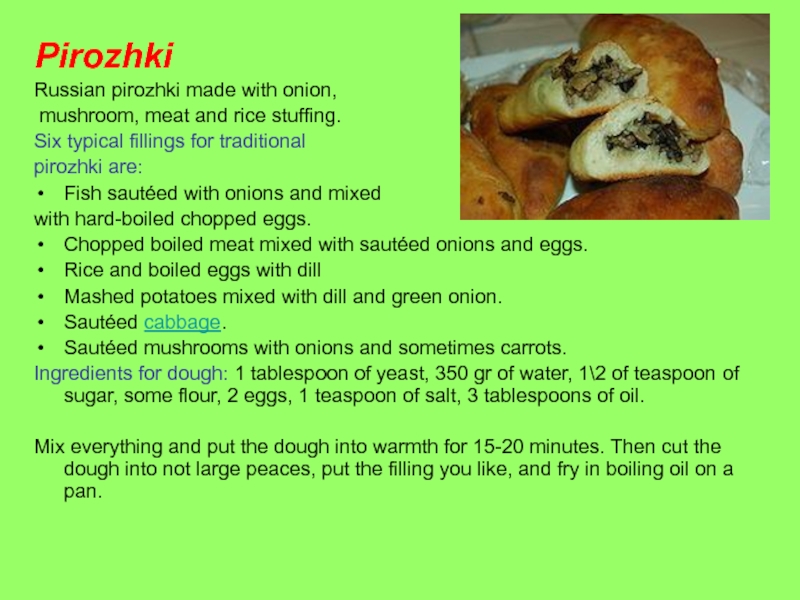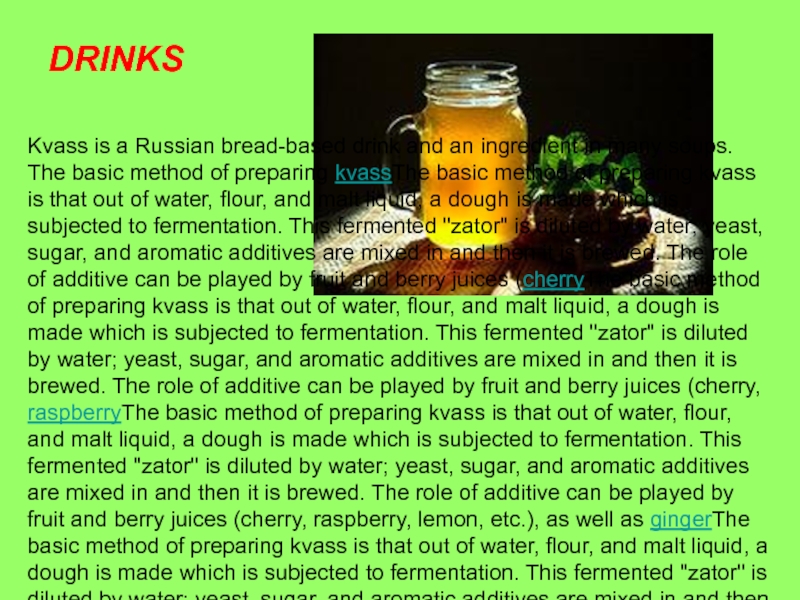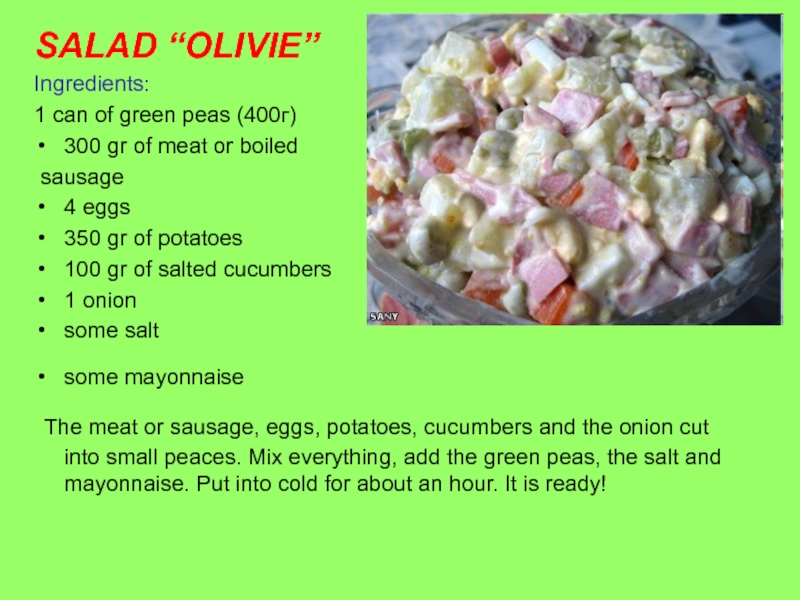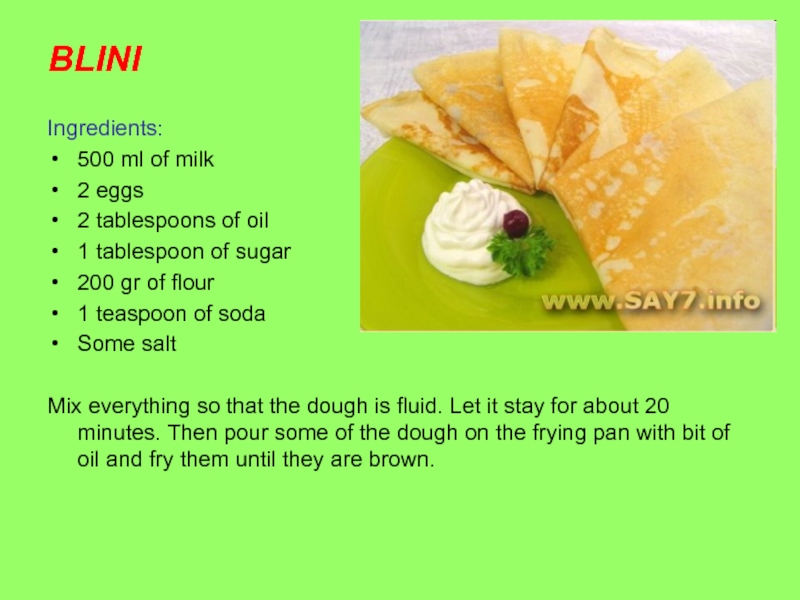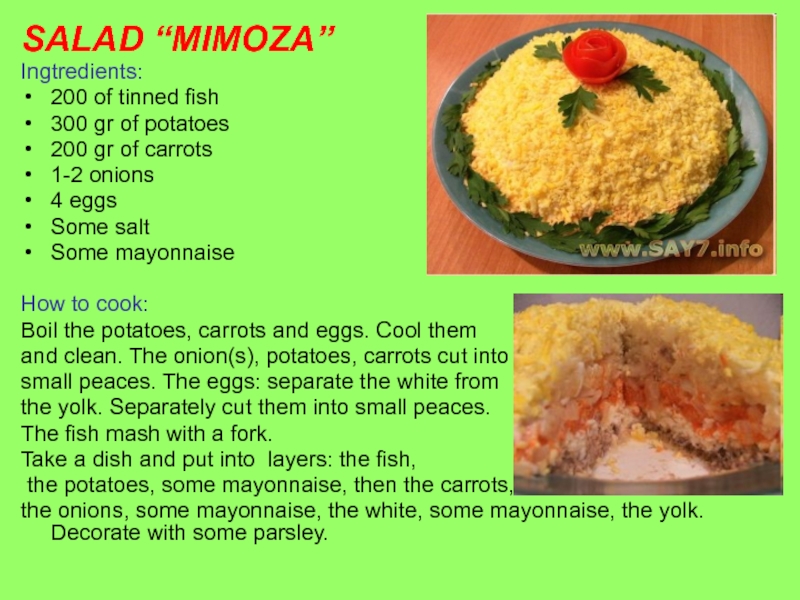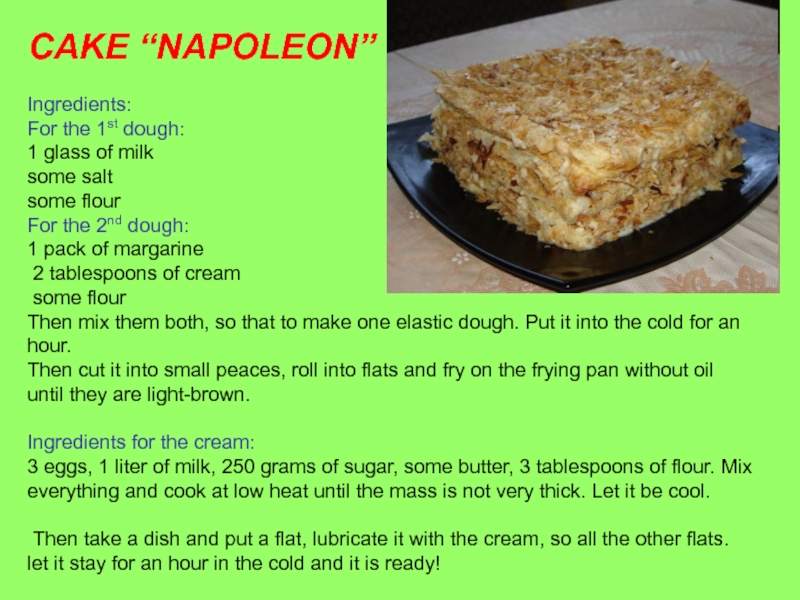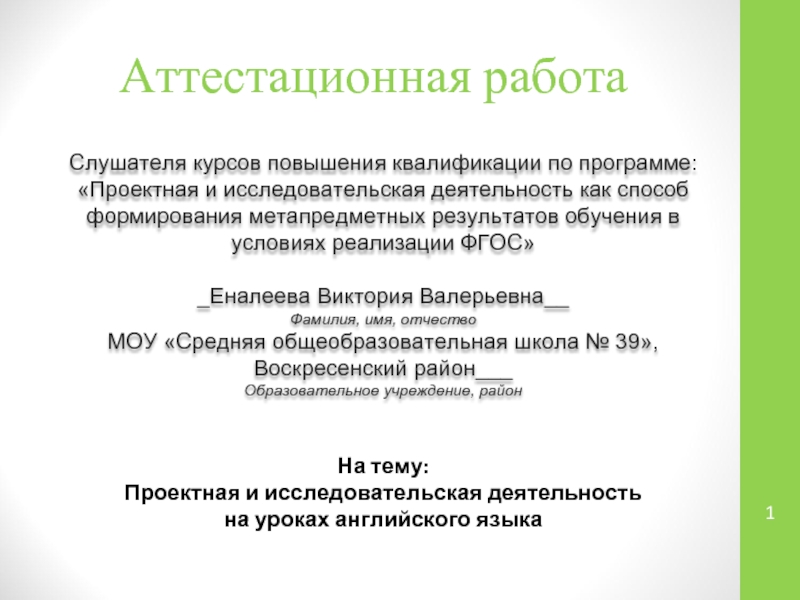Students of the 9th form school 9 New Tselina,
Rostov region, Russia
Teacher: Larisa Khrykina
April 2010
- Главная
- Разное
- Дизайн
- Бизнес и предпринимательство
- Аналитика
- Образование
- Развлечения
- Красота и здоровье
- Финансы
- Государство
- Путешествия
- Спорт
- Недвижимость
- Армия
- Графика
- Культурология
- Еда и кулинария
- Лингвистика
- Английский язык
- Астрономия
- Алгебра
- Биология
- География
- Детские презентации
- Информатика
- История
- Литература
- Маркетинг
- Математика
- Медицина
- Менеджмент
- Музыка
- МХК
- Немецкий язык
- ОБЖ
- Обществознание
- Окружающий мир
- Педагогика
- Русский язык
- Технология
- Физика
- Философия
- Химия
- Шаблоны, картинки для презентаций
- Экология
- Экономика
- Юриспруденция
russian Cuisine презентация
Содержание
- 1. russian Cuisine
- 2. Russian cuisine derives its rich and varied
- 3. In our Russian recipes cookbook you'll find
- 4. OKROSHKA Okroshka is a
- 5. HOT SOUPS Shchi (cabbage soup)
- 6. UKHA is a warm watery fish
- 7. BORSCH is made of broth, beets, and
- 8. KOTLETY(cotelettes, meatballs), a Western European dish popular
- 9. SHASHLYK OUT IN NATURE Shashlyk is
- 10. Pirozhki Russian pirozhki made with onion,
- 11. DRINKS Kvass is a Russian bread-based
- 12. SALAD “OLIVIE” Ingredients: 1 can of green
- 13. BLINI Ingredients: 500 ml of milk
- 14. SALAD “MIMOZA” Ingtredients: 200 of tinned fish
- 15. CAKE “NAPOLEON” Ingredients: For the 1st
Слайд 1Welcome to the Russian cuisine and cooking recipes, the place for
Слайд 2Russian cuisine derives its rich and varied character from the vast
From the time of Catherine the GreatFrom the time of Catherine the Great, every family of influence imported both the products and personnel—mainly German, Austrian, and French—to bring the finest, rarest, and most creative foods to their table. Many of the foods that are considered in the West to be traditionally Russian actually come from the Franco-Russian cuisine of the 18th and 19th centuries, and include such widespread dishes as Veal OrloffFrom the time of Catherine the Great, every family of influence imported both the products and personnel—mainly German, Austrian, and French—to bring the finest, rarest, and most creative foods to their table. Many of the foods that are considered in the West to be traditionally Russian actually come from the Franco-Russian cuisine of the 18th and 19th centuries, and include such widespread dishes as Veal Orloff, Beef StroganoffFrom the time of Catherine the Great, every family of influence imported both the products and personnel—mainly German, Austrian, and French—to bring the finest, rarest, and most creative foods to their table. Many of the foods that are considered in the West to be traditionally Russian actually come from the Franco-Russian cuisine of the 18th and 19th centuries, and include such widespread dishes as Veal Orloff, Beef Stroganoff, and Chicken Kiev. In our Cookery Book you’ll find the traditional Russian dishes:Tasty Russian Pelmeni, Okroshka, Shchi, Ukha,Russian Borsch, Kotlety, Shashlyk, Pirozhki, Kvass, Russian Blini, Salad "Olivier“, «Mimosa» salad, Cake "Napoleon“.
Слайд 3In our Russian recipes cookbook you'll find a great number of
TASTY RUSSIAN PELMENI
Most people associate pelmeni with Siberia, and many recipes and references to the dish call it "Siberian dumplings." Pelmeni probably did originate in Siberia, where hundreds or even thousands could be made, and then frozen and stored outside during the long winters.
For the dough you will need: 1 egg, some salt, a glass of water and some flour.
Mix everything, so that the dough is elastic. Let it stay for an hour, regularly knead. While waiting make the stuffing: milled meat (better pork) mix with some salt, pepper, milled 3 onions.
Cut the dough into small pieces, put in the pieces of meat and press around like in the picture. When they are ready, put pelmeni into boiling salted water and let them boil for about 10 minutes.
Then take them out, put on a plate and serve hot with cream. Bon appetite!
MOST POPULAR DISHES
Слайд 4 OKROSHKA Okroshka is a cold soup based on kvass or
Слайд 5
HOT SOUPS
Shchi (cabbage soup) had been the main first course
in
Although tastes have changed, it steadily made its way
through several epochs. Shchi knew no social class boundaries,
and even if the rich had richer ingredients and the poor made it
solely of cabbage and onions, all these "poor" and "rich" variations were cooked in the
same tradition. Many Russian proverbs are connected to this soup, such as Shchi da kasha pishcha nasha ("Shchi and porridge are our food"). It can be eaten regularly, and at any time of the year.
The richer variant of shchi includes several ingredients, but the first and last components are a must:
Cabbage.
Meat (very rarely fish or mushrooms).
Carrots or parsley roots.
Spicy herbs (onions, celery, dill, garlic, pepper, bay leaf).
Sour components (smetana, apples, sauerkraut, pickle water).
When this soup is served, smetanaWhen this soup is served, smetana is added. It is eaten with rye bread. During much of the year when the Orthodox Christian Church prescribes abstinence from meat and dairy, a vegan version of shchi is made. "Kislye" (sour) schi are made from pickled cabbage (sauerkraut), "serye" (grey) schi from the green outer leaves of the cabbage head. "Zelyonye" (green) schi are made from sorrel leaves, not cabbage, and used to be a popular summer soup.
Слайд 6UKHA
is a warm watery fish dish.
Ingredients:
1 kg of any fish
800
150 gr of carrots
150 gr of onions
parsley, pepper, laurels, salt.
Clean the fish and boil it for 25-30 minuts.
Then add the potatoes, salt and pepper. Boil for 15 minutes.
Then add the laurels and the parsley.
Let it stay for about 25-30 minutes.
Bon appetite!
Слайд 7BORSCH is made of broth, beets, and tomato juice with various
Ingredients:
1 kg of beef
500 gr of potatoes
300 gr of cabbage
400 gr of beet
200 gr of carrots
200 gr of onions
3 tablespoons of tomato juice
2-3 laurels
Some parsley, salt, pepper, oil.
4 liters of water
The time of cooking is about 1 hour and 30 minutes. Put the meat into the boiling water and boil it for about an hour. Then add sliced potatoes. Let it boil for about 20 minutes. At this time heat the sliced beet, carrots and onions, the tomato paste in the oil. Then put it into the broth. Slice the cabbage and put it into the broth too. Add the parsley, laurels, salt, pepper and boil for 5 minutes. Serve hot with cream.
Слайд 8KOTLETY(cotelettes, meatballs), a Western European dish popular in modern Russian households,
Слайд 9SHASHLYK OUT IN NATURE Shashlyk is a form of Shish kebab (marinated
Слайд 10Pirozhki
Russian pirozhki made with onion,
mushroom, meat and rice stuffing.
Six typical
pirozhki are:
Fish sautéed with onions and mixed
with hard-boiled chopped eggs.
Chopped boiled meat mixed with sautéed onions and eggs.
Rice and boiled eggs with dill
Mashed potatoes mixed with dill and green onion.
Sautéed cabbage.
Sautéed mushrooms with onions and sometimes carrots.
Ingredients for dough: 1 tablespoon of yeast, 350 gr of water, 1\2 of teaspoon of sugar, some flour, 2 eggs, 1 teaspoon of salt, 3 tablespoons of oil.
Mix everything and put the dough into warmth for 15-20 minutes. Then cut the dough into not large peaces, put the filling you like, and fry in boiling oil on a pan.
Слайд 11DRINKS
Kvass is a Russian bread-based drink and an ingredient in many
The basic method of preparing kvassThe basic method of preparing kvass is that out of water, flour, and malt liquid, a dough is made which is subjected to fermentation. This fermented "zator" is diluted by water; yeast, sugar, and aromatic additives are mixed in and then it is brewed. The role of additive can be played by fruit and berry juices (cherryThe basic method of preparing kvass is that out of water, flour, and malt liquid, a dough is made which is subjected to fermentation. This fermented "zator" is diluted by water; yeast, sugar, and aromatic additives are mixed in and then it is brewed. The role of additive can be played by fruit and berry juices (cherry, raspberryThe basic method of preparing kvass is that out of water, flour, and malt liquid, a dough is made which is subjected to fermentation. This fermented "zator" is diluted by water; yeast, sugar, and aromatic additives are mixed in and then it is brewed. The role of additive can be played by fruit and berry juices (cherry, raspberry, lemon, etc.), as well as gingerThe basic method of preparing kvass is that out of water, flour, and malt liquid, a dough is made which is subjected to fermentation. This fermented "zator" is diluted by water; yeast, sugar, and aromatic additives are mixed in and then it is brewed. The role of additive can be played by fruit and berry juices (cherry, raspberry, lemon, etc.), as well as ginger and mint
Слайд 12SALAD “OLIVIE”
Ingredients:
1 can of green peas (400г)
300 gr of meat or
sausage
4 eggs
350 gr of potatoes
100 gr of salted cucumbers
1 onion
some salt
some mayonnaise
The meat or sausage, eggs, potatoes, cucumbers and the onion cut into small peaces. Mix everything, add the green peas, the salt and mayonnaise. Put into cold for about an hour. It is ready!
Слайд 13BLINI
Ingredients:
500 ml of milk
2 eggs
2 tablespoons of oil
1 tablespoon of sugar
200
1 teaspoon of soda
Some salt
Mix everything so that the dough is fluid. Let it stay for about 20 minutes. Then pour some of the dough on the frying pan with bit of oil and fry them until they are brown.
Слайд 14SALAD “MIMOZA”
Ingtredients:
200 of tinned fish
300 gr of potatoes
200 gr of carrots
1-2
4 eggs
Some salt
Some mayonnaise
How to cook:
Boil the potatoes, carrots and eggs. Cool them
and clean. The onion(s), potatoes, carrots cut into
small peaces. The eggs: separate the white from
the yolk. Separately cut them into small peaces.
The fish mash with a fork.
Take a dish and put into layers: the fish,
the potatoes, some mayonnaise, then the carrots,
the onions, some mayonnaise, the white, some mayonnaise, the yolk. Decorate with some parsley.
